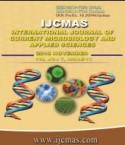


 National Academy of Agricultural Sciences (NAAS)
National Academy of Agricultural Sciences (NAAS)

|
PRINT ISSN : 2319-7692
Online ISSN : 2319-7706 Issues : 12 per year Publisher : Excellent Publishers Email : editorijcmas@gmail.com / submit@ijcmas.com Editor-in-chief: Dr.M.Prakash Index Copernicus ICV 2018: 95.39 NAAS RATING 2020: 5.38 |
Interpersonal intelligence (“people smart”) is ability to see things from other people’s point of view in order to understand how they think and feel. Whereas, Intrapersonal intelligence (“self-smart”) is the ability to self-reflect, to understand inner feelings, dreams, relationships with others, and strengths and weaknesses. Ecological Systems Theory given by Urie Bronfenbrenner in 1940s focuses that there are five layers arranged from the closest to the individual to the farthest: the microsystem, mesosystem, exosystem, macrosystem and chronosystem. These all systems directly or indirectly affect the individual growth and development. Hence, the effect of these variables was studied along with Multiple Intelligence of the young adolescents. For this, 200 respondents in the age group of 12-14 years from both urban and rural area of Mahendergarh district of Haryana state were selected. Both interpersonal and intrapersonal intelligences of the respondents’ were observed to be significantly associated with family size, parental education and residence location. It is clear from the research that the other microsystem variables had no significant association with both interpersonal and intrapersonal intelligences of the respondents.
 |
 |
 |
 |
 |